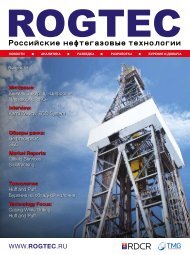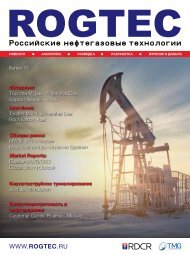ROGTEC Issue 62
Russian Oil & Gas Magazine
Russian Oil & Gas Magazine
You also want an ePaper? Increase the reach of your titles
YUMPU automatically turns print PDFs into web optimized ePapers that Google loves.
ГЛОБАЛЬНАЯ ЭНЕРГЕТИКА
ДАТСКИЙ
ПРОЛИВ
БОСФОР
СУЭЦКИЙ
КАНАЛ
ОРМУЗСКИЙ
ПРОЛИВ
ПАНАМСКИЙ
КАНАЛ
БАБ-ЭЛЬ-
МАНДЕБСКИЙ
ПРОЛИВ
МАЛАККА
Рис. 1: Глобальные коридоры транспортировки нефти, и основные перевалочные пункты в июне 2019 года на пике нефтедобычи.
Мировая добыча нефти, в июне 2019 года, достигла уровня 100 млн.баррелей в сутки, впервые за всю историю добычи перешагнув
барьер в 100 млн. баррелей нефти, добытой за сутки. Более 65 процентов этого объема (65 млн.барр./сут) транспортировалось
по морю. Цифры, представленные по перевалочным пунктам, показывают 50 млн. баррелей нефти в сутки, и оставшиеся 15
миллионов, которые транспортировались вне основных морских маршрутов.
Ормузский пролив и Малакка являются крупнейшими стратегическими морскими транзитными точками мира и потенциальными
перевалочными пунктами, учитывая объем, который проходит через них. В мире есть еще пять более значительных транзитных
точек, являющихся чрезвычайно важными для транспортировки больших объемов нефти, и среди них выделяются Суэцкий канал
и Баб-эль-Мандебский пролив (расположенный между Африканским Рогом и Ближним Востоком), Датский и Турецкий (Босфор)
проливы, Панамский канал и мыс Доброй Надежды.
Fig. 1: Global oil transportation corridors and the main chokepoints in June 2019 at the peak of oil production.
The world produced over 100 m bbls of oil per day in June 2019 reaching the first time in the history the barrier of 100 m bbls of oil produced per day.
Over 65 percent of this volume (65 m bbls per day) was transported by sea. The numbers presented for the main chokepoints represent 50 m bbls of
oil, with the remaining 15 m being transported outside of the main sea routes.
The straits of Hormuz and Malacca are the world’s most strategic maritime transit points and potential chokepoints, considering the volume of oil that
passes through. There are five more significant transit points in the world, which are crucial for high volumes of energy transportation including the
Suez Canal and Bab el-Mandeb (located between the Horn of Africa and the Middle East), the Danish and Turkish straits, the Panama Canal and the
Cape of Good Hope.
всевозможные товары и услуги. Это также
касается и продукции нефтегазового сектора и его
производственно-сбытовых цепочек, зависимых от
политической стабильности (рис.1).
Автономизация означает разрывание глобальной
энергетической логистики, закрытие корридоров
транспортировки энергоносителей между двумя
крупнейшими экономическими державами,
замораживание иностранных инвестиций, и
сжигание геополитических мостов, построенных
за прошедшие три десятилетия между странами
Запада и Востока. Это означает инфляцию,
стимулируемую ростом издержек производства, и
замедление инновационного и технологического
обмена. Это также означает санкции, торговые
и ценовые войны. В результате всего этого,
глобальное снабжение энергоносителями
otherwise be spent on investments, development
projects, and technological advancement. Further
deterioration of the US-China relationship to the
extent that countries must decide to trade with a
partner they value most, is probable. If a country
is to «choose» to side with the USA, the energy
companies of such country will be obliged to reduce
their dependencies on China and China’s sphere of
influence (figure 2).
As a consequence, energy supply chains are predicted
to become more regional, even national, improving
safety of supplies and reducing the geopolitical impact
of trade in the process. The only suitable solution for
establishing such security and the energy flow stability
is to create one’s own independent energy source and
to remove political dependencies in the supply chains’
systems.
50
ROGTEC
www.rogtecmagazine.com















